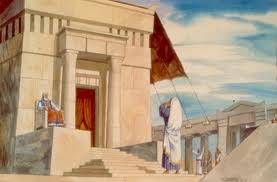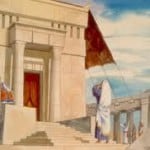A scholar, recently arrived from America, was deeply disturbed. He went to visit Rav Kook, unburdening his severe disappointment about the state of religious observance in Eretz Yisrael. He was shocked by the sight of irreligious Jews desecrating the Sabbath, eating forbidden foods, and rebelling against Jewish traditions in the Holy Land. How could he raise his children in such an environment? He was so upset, that he contemplated returning to America.
Ascending to Shiloh
Rav Kook replied to him:
Surely you remember the story from the beginning of the book of Samuel, a story which you studied as a child. The book relates how Elkanah, the father of the prophet Samuel,
“would ascend each year from his town, to prostrate himself and bring offerings to God at Shiloh. And there, Eli’s two sons Hophni and Phinhas, served as kohanim to God” (I Sam. 1:3).
It is curious that the verse mentions the High Priest’s sons, Hophni and Phinhas. What is their connection to Elkanah’s yearly pilgrimage to Shiloh?
The Midrash teaches that Elkanah didn’t just travel to Shiloh. Elkanah wanted to encourage others to fulfill the mitzvah of aliyah la-regel, of visiting the central sanctuary on the holidays. In order to publicize the mitzvah and convince others to join him, each year Elkanah would take to a different route to Shiloh.
One might ask: What happened that the mitzvah of aliyah la-regel — a mitzvah mentioned several times in the Torah — became so lax in his generation, so that Elkanah felt it was necessary to bolster its observance?
The second question answers the first question. Hophni and Phinhas are described as corrupt individuals who were punished severely for their actions in the Shiloh sanctuary. The fact that they served as kohanim was the reason that many chose not to visit Shiloh. If kohanim like Hophni and Phinhas serve in the Tabernacle, people reasoned, it is preferable not to travel there and be exposed such scandalous behavior.
Elkanah, however, saw the matter differently. He told the people that, despite the corruption and improper behavior, we should not sever our connection to this holy place. We may not abandon God’s mitzvah. Rather, it is our duty to ascend to Shiloh and strengthen the holiness of the place.
It was due to his noble efforts that Elkanah was rewarded with a son who was a great prophet and leader.
Strengthening Holiness in the Land
At this point Rav Kook turned to his guest:
We learn from here an important lesson regarding Eretz Yisrael. The fact that there are irreligious Jews living here should not be a reason for us to abandon the mitzvah of dwelling in the Land of Israel. And certainly one should not consider leaving the country. Every individual who lives in Eretz Yisrael and observes Torah and mitzvot adds greater holiness to the Land.
Those who dwell in Eretz Yisrael in holiness, Rav Kook assured the scholar, will merit children about whom they will be able to say with pride — like Hannah, Samuel’s mother — “It was for this child that I prayed” (Sam. 1:27).
(Adapted from Chayei HaRe’iyah by Rabbi Moshe Zvi Neriah, pp. 211-212)

